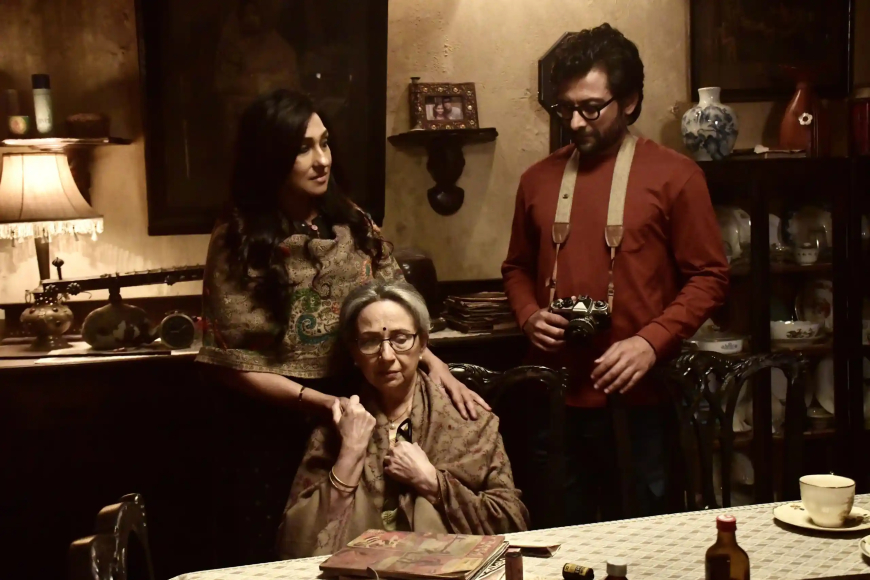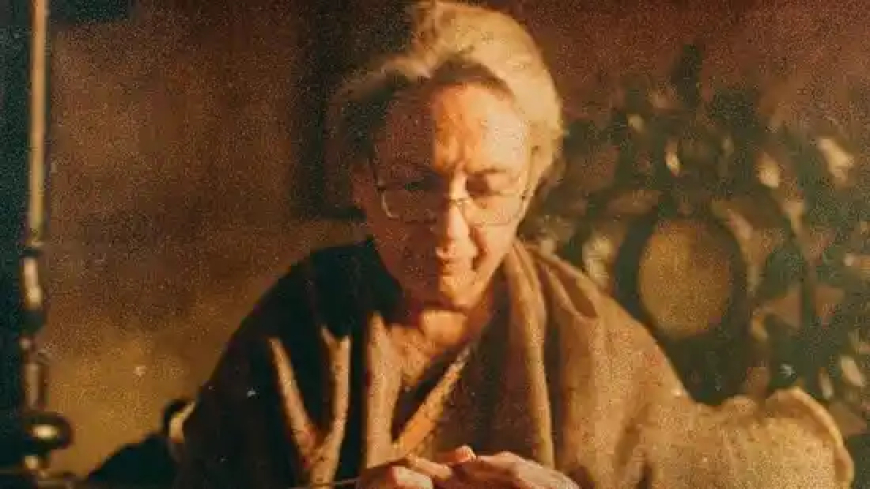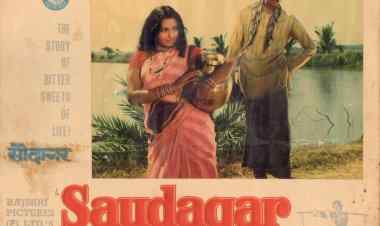Review : PURATAWN – THE ANCIENT
Dr. Shoma A. Chatterji provides a deep review of Puratawn – The Ancient, analyzing Suman Ghosh’s poignant portrayal of aging, memory, and futurophobia through a layered narrative and Sharmila Tagore’s remarkable return to Bengali cinema.
For a veteran critic who is an octogenarian herself, watching another octogenarian on screen distanced from her own social ambience, is both interesting and worrisome. Interesting because it opens up an alternative world the critic does not really know about. Worrisome because the issues Mrs. Sen (Sharmila Tagore) in Suman Ghosh’s new film Puratawn is faced with in her chosen, lonely world feels something that could affect the observer (me) as well. Does this mean that Suman Ghosh’s best film to date is targeted at senior citizens alone? Certainly not. In fact, Puratawn is a film which chooses to speak in Bengali mainly and some smattering of English, deals with a global problem not commonly discussed among us.
Puratawn is Economics Professor-cum-filmmaker Suman Ghosh’s new film which, one can freely say is his best film to date. Based on his own story, it narrates a complex tale through a straightforward narrative that often, like its protagonist Mrs. Sen, travels back and forth in time, preferring to live in the past over accepting the present which, for her, is also her future. But unlike Mrs. Sen who prefers to wrap the past around her, Ghosh’s narrative chooses to peep into her past through her present which includes her adult daughter Rittika (Rituparna Sengupta) and her husband Rajeev (Indraneil Sengupta) who is an adventure photographer who also loves to journey through difficult Nature travelling. This once created a warm bond with Rittika which led to a very quiet and low-profile marriage. Ghosh keeps the marriage away from the frame because that is not a part of the story and the Sens are quite private people.
Mrs. Sen, by her own choice, lives alone in an antique old house in the suburbs of Kolkata, within her past with her young caretaker (Brishti Roy) who is terrified to step into the ancient store-room for fear of spiders and other insects who find free movement within this dusty room filled with old albums with photographs slipping out of its leaves, old books, letters that will tear to pieces if touched, musical instruments, objets de art ‘safeguarded’ by loads of dust, spider’s nets hanging from the dirty ceiling and so on.
Rittika, a successful entrepreneur who lives in a different city, arrives to visit her mother to celebrate her 80th birthday. Her husband Rajeev, she is having problems with, has already arrived. But Rittika is extremely worried to find her mother stepping into the kitchen to make her daughter’s school tiffin while the adult Rittika, who her mother addresses as Mamoni, watches her mother disturbed by her addressing her as if she is still a school girl. Rittika consults her childhood friend Gaurika (Ekavali Khnna), a psychiatrist, about her mother’s condition. Gaurika informs her that Mrs. Sen is not a patient of Alzheimers’ at all but chooses to frequently live within her part as she is afraid of the present which is also her future.
Rajeev explains that Mrs.Sen should be allowed to live in her own space according to her own terms, away from the noise and bustle of the city, unlike them who are already trapped in the hubbub of post-modern city life. For the first time, Ghosh, through the character of Mrs. Sen, points out to this little-known problem called Futurophobia.
Future phobia, more accurately described as anticipatory anxiety or dreading the future, is a type of anxiety characterized by a fear or worry about potential negative events in the future. It can involve ruminating over worst-case scenarios, feeling tense or irritable, and experiencing other anxiety symptoms like increased heart rate or difficulty concentrating. Ritika is rightly worried and as we find that the mother-daughter role has reversed, we discover a facet of the relationship which we were probably not aware of before.
There is a touching scene in the film where Mrs. Sen looks at the large mirror wondering who the lady looking back at her is. Rittika and the young maid points out it is her own reflection she is seeing in the mirror. In another scene, we see Mrs. Sen suddenly walking out of the house and into the neighbourhood to invite non-existent neighbours of her past to a Satyanarayana Pooja in their home the following day while Rittika, the maid and Rajeev step out looking out for her frantically. The 8oth birthday is quietly celebrated with the mandatory birthday cake with “80” iced on it, quietly as Mrs.Sen prefers to stick to her privacy.
The antique house may be rightly defined as the protagonist of the film or perhaps, a ‘character’ parallel to that of Mrs. Sen. Everything in the ancestral house with curving vines falling across its cracking outside walls, the garden and the trees showing signs of neglect though Mrs. Sen tries to tend to them as and when she is not waiting at the edge of the garden facing a river waiting for Mamoni to return from school because it is quite late. At one point, she looks up to find Rittika standing beside her and asks her “who are you”? Rittika’s pained face says it all.
Ghosh was about to give up the film because he could not locate the right house till his chief assistant discovered the ramshackle, abandoned house in Titagarh Jute Mill which melted into the film as if it was created to perform in it as a character. Even the garden that surrounds the house is uncared for, overgrown with bushes and trees. This turned out to become cinematographer Ravi Kiran Ayyagari’s trump card which alternately shows his camera closing in on Mrs. Sen’s wrinkled skin, her peaceful face to show us what the word “Puratawn” really means.
Ayyari must have thrilled about his cinematographic choices in the visual, beautiful locations capturing the splendor of Nature when his camera caresses the greens and blues and whites of Nature where Rittika and Rajeev find each other as he must have in the flashbacks captured in B & W where Mrs. Sen is discovered singing her favourite old Tagore number on her ancient harmonium as her (dead) husband watches quietly.
If Puratawn is a cinematographer’s delight, it is even more a delight for the production design executed masterfully by Tanmoy Chakraborty whose research into old houses and what they contain comes across in the film through the store room, the beautifully lit dining space with its old-school crockery and even the near-empty neighbourhood which once was. Aditya Bikram Sengupta’s editing cuts and stitches through the swift time and space changes right through the film without making us feel the change at all.
The muted music by Alokananda Dasgupta is mood-centric and weaves itself into the retrospective ambience of the film beautifully. The old Tagore number by Soma Dalui Bodhak and the other song, a slow number by Shreya Ghosal add to the rich texture of the film beautifully.
But the miracle lies both in the characterisation and in the performance of the five characters, never mind the footage they capture. Sharmila Tagore at eighty, making a comeback to Bengali cinema after 14 years, has triumphantly shed all her starry, on-screen mannerisms, her off-and-on sing-song dialogue delivery and her coquettish gestures so naturally that it appears as if we are looking at an actor reborn as Mrs. Sen who has metamorphosed into a brilliant actress through the magic wand of director Suman Ghosh. Tagore has always been a director’s actress and this film proves it without question. Whether it was Shakti Samanta’s Kashmir Ki Kali or Ray’s Devi, or Tapan Sinha’s Nirjan Saikate, or Aniruddha Roychoudhury’s Antaheen, she has proved her versatility as a director’s actress.
Indraneil Sengupta, largely underutilized by Bengali cinema, throws up a masterpiece of a performance aided by the new look the director has given him. Rituparna Sengupta who has also produced the film, has shed her mainstream image completely to internalize the confused and worried Rittika who suddenly discovers that the mother-daughter responsibilities have reversed in her current rapport with her stubborn mother which somehow helps in cementing her fractured relationship with Rajeev. Ekavali Khanna, often relegated to bit cameos, is tender as Gaurika, the psychiatrist friend of the Sen family. But the prize should rightfully go to Brishti Roy as the sprightly young maid who is warm and affectionate towards her “thakuma’ she takes care of so well and is not for a moment unnerved by the veteran actors she is pitted against.
The name Puratawn, roughly translated to “The Ancient” by the director, goes far beyond its literal meaning to embrace an ever-changing, post-modern, global world where relationhips too, are as dynamic and as vaccilating as time and as Life itself.
*****
What's Your Reaction?



































































